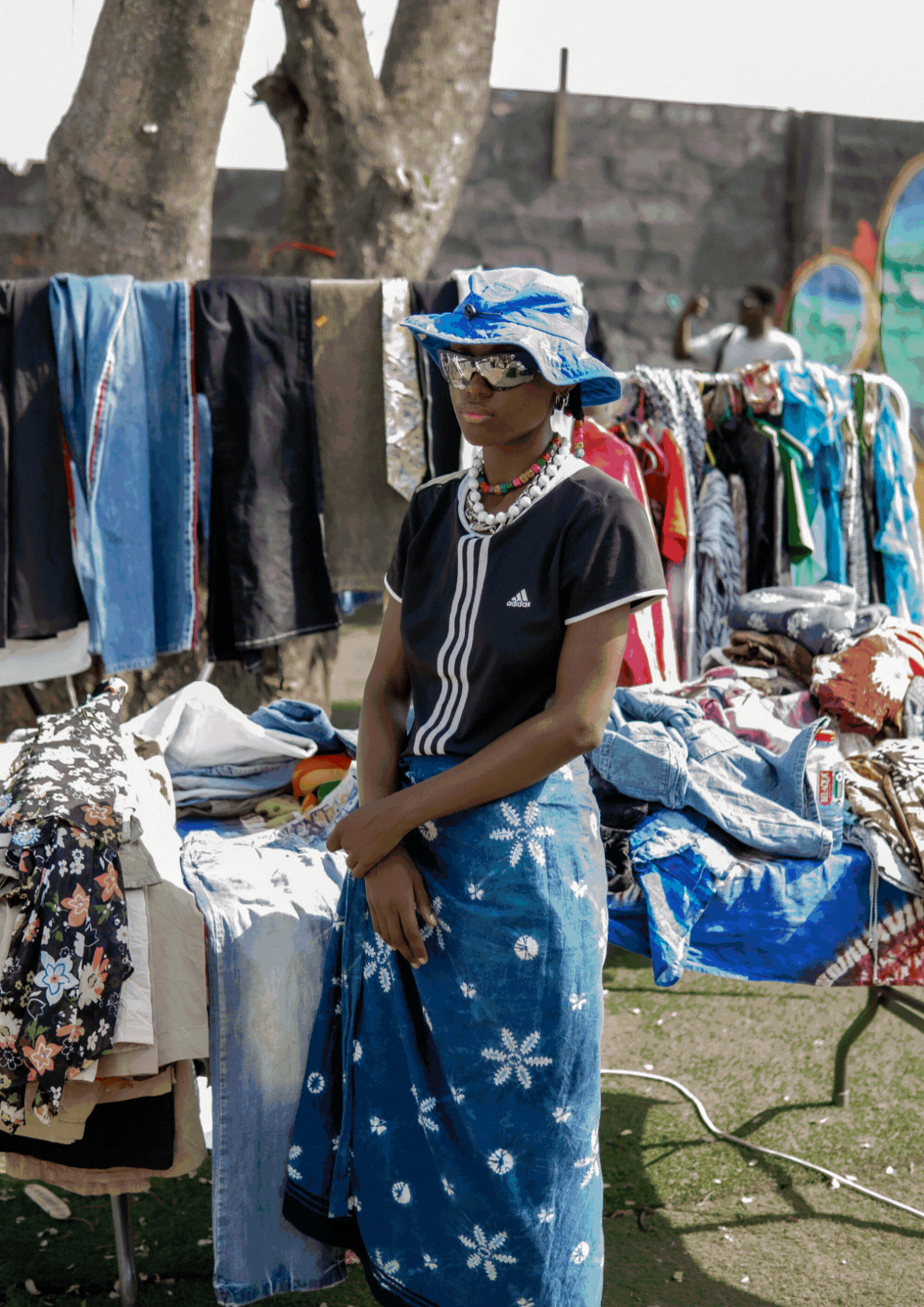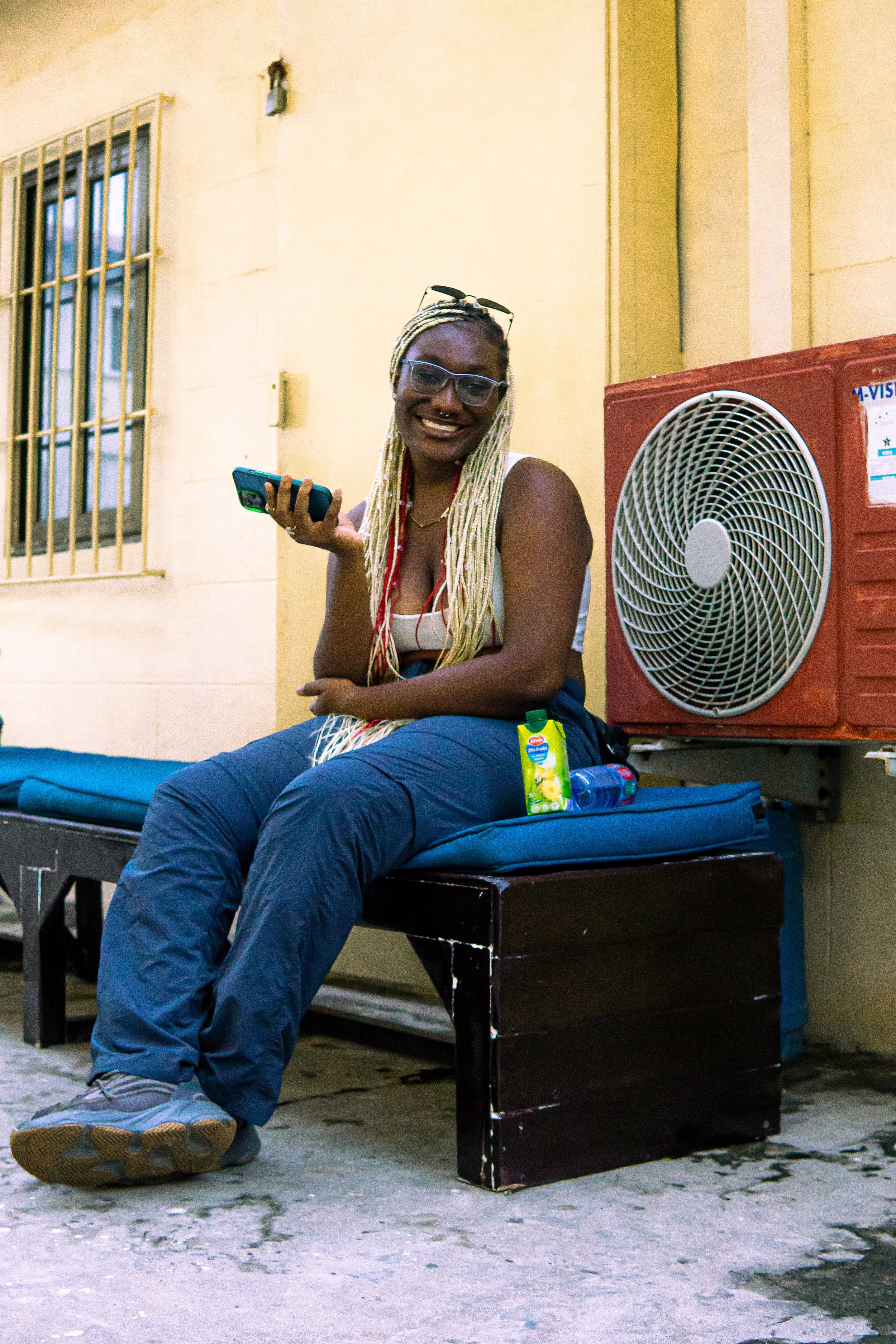Accra in Bloom: Sustainability & Fashion in the City
Accra in Bloom: Sustainability & Fashion in the City
The other day the owner of a clothing store asked us if we could help them curate a clothes swap event as it is something they have been considering for a while. It’s starting to look like people’s superstitions and religious beliefs are slowly losing their grip on sustainable fashion lifestyle options.
This got me thinking about the slow but steady rise of sustainability in fashion within the city of Accra. So, let’s embark on a mindful journey through Accra's sustainable fashion landscape. This will be an exploration of what's great, what needs work, and how the GoTo Fair is bringing exciting solutions to the table.
A scene birthed from culture
Accra, the vibrant fashion capital of Ghana, is witnessing an inspiring shift towards sustainable and ethical fashion practices. The city’s fashion enthusiasts have embraced sustainable and ethical fashion practices, that to be fair have been embedded in their culture for generations. It's not just about looking fabulous but also about making conscious choices and long-standing places like Kantamanto Market and more recent spaces like Upcycle Thrift Ghana have allowed preloved fashion to become a staple. Is this a fashion rebirth at the cost of local textile economies or a transition that will create a generation born to embrace both? Fashion lovers recognize the importance of supporting authentic sustainable brands that are blossoming across the city. Some of those brands are J’Karta, Larry Jay, Threaded Tribes, Withlovezie, and a personal favourite, Akataasia. They all make it a point to embrace local craftsmanship while creating modern pieces that can be exported to the world. Although these are largely more appealing and affordable for middle to upper-class Ghanaians. Still, no matter the class, dressing up and looking good is something all Ghanaians embrace. From wearing traditional clothes, and tailor-made pieces to wearing more Western styles, their sense of fashion is impeccable.
The concept of mindful consumption and understanding that looking good doesn't have to come at the expense of the planet or exploited labour is seeping into fashion circles, celebrating the rise of authentic sustainable brands that prioritize fair trade, use eco-friendly materials, and empower local artisans. Leading Ghanaian bloggers like Debbie Beeko launch brands with the idea of creating unique one-off limited pieces. Limited pieces are a Ghanaian fashion staple. Most designers and brands will create one-off, unique pieces for customers that no one else will have. We pride ourselves on looking unmatched wherever we go. Although this is considered nowadays as a sustainable practice, it’s been in Ghanaian fashion since day one.
Local brands are trying to champion transparency, using eco-friendly materials, supporting local artisans, and prioritizing ethical production processes. Tie and dye techniques, the use of beads, shells, wood, hand weaving, botanical dyeing, glass bead making, hand-knitting, and hand crochet all are ways in which the Ghanaian culture has always engaged with fashion. Today, Accra's fashion brands have become the reinventors, showcasing that sustainability and style go hand in hand by weaving these cultural elements into new clothes. Brands like Osei Duro, Crochel, and J’karta have been doing justice to fashion by falling back to these practices.
Accra's fashion lovers have also mastered the art of clothes swapping, a fun and sustainable way to refresh our wardrobes. If you ask me, clothes swapping takes a cue from age-old Ghanaian practices like hand-me-downs and sharing clothes. Swapping events and platforms have popped up, allowing us to give new life to pre-loved garments and accessories, while also connecting with like-minded individuals. Ghanaian culture is rooted in community but superstitions and certain beliefs have up till now discouraged locals from participating in any form of clothes swapping despite the popularity of hand-me-downs and clothes sharing among family members and the immediate community in the very recent past. But thank goodness for this return to accepting sharing and appreciating second-hand fashion which, I feel, has further strengthened this sense of community. The rise of influencer brands like Lucky Blezz who are popularizing DIY trends is impactful especially in times like this when people are battling high living costs and the consequences of improper management of fashion waste. In August 2019, the Kpone landfill caught fire and continued to burn long into 2020. With the most recent Kpone fire outbreak being in March 2022. The fire destroyed the homes of 15 waste pickers who lived close to the landfill. Non-profits like the OR Foundation were on the grounds to support and need our donations to increase their support at times like this.
Nonetheless, Accra is witnessing a remarkable shift towards sustainability in its fashion ecosystem. We’ve practised sustainability without calling it sustainability for generations but this time with the increasing knowledge of the fashion industry’s impact, there is a desire to be intentional with how we express ourselves. From sorting and upcycling garments in markets like Kantamanto to fair trade initiatives, Accra's sustainable fashion scene is growing, thanks to the efforts of passionate change-makers.
Nurturing this scene for impact
While Accra's sustainable fashion landscape is blooming, there are still challenges that need to be addressed. One crucial aspect is raising awareness and changing mindsets within the broader community. Education is key to combatting misconceptions about sustainable fashion and making it accessible to all. We need to bridge the gap and ensure that sustainable fashion is not just a niche trend but a widespread movement that benefits local less privileged communities throughout the city.
Fast fashion's influence remains prevalent, tempting us with its affordability and trendy designs. With the advancements made in e-commerce, fast fashion brands have become accessible now more than ever. With brands like H&M coming into Accra and e-commerce businesses like ASOS or Zara delivering there, accessibility to fast fashion is heightened. Mixing that with social media temptations to stay relevant, young people start contributing to the devastating fashion system despite its negative impact in Accra. It's essential to raise awareness about the environmental and social impact of fast fashion, inspiring individuals to make mindful choices and shift towards more local sustainable alternatives. Simply by reminding them that Ghanaian culture has always loved fashion sustainably and that the way we’ve always done this is worth preserving. Especially as fast fashion’s impact on the city remains visible, with clumps of clothes washing to the shore of beaches and landfills of clothes spilling over.
Aside from retaining cultural practices around fashion, access to sustainable fashion options should be improved. While authentic sustainable brands are emerging, their accessibility can be limited for some. Expanding the availability of sustainable fashion in various price ranges and sizes will ensure inclusivity and cater to a broader audience. Collaboration between designers, retailers, and policymakers is key to overcoming these hurdles too.
GoTo Fair: a beacon of hope in Accra’s sustainability revival
For the longest time, the sustainability message and community have been clouded with an air of elitism and “luxury”. In Accra, this has aggravated the disconnect between sustainability and the larger community. Although often, the larger communities already live sustainable lifestyles. The result has been a sheer indifference to intentional sustainable lifestyle choices and maybe, even a disdain for the concept. If we will make significant gains in this department, then we should work to leave no one behind. Candid conversations and empowerment of local communities, and the introduction and accessibility of sustainable options in the marketplace will be a good starting place to pique consumers’ interest in the topic. Let’s educate by celebrating the practices that are already sustainable and ethical by teaching people to own these skills and share them, while also teaching them new avenues for sustainable living. Outside of the market, engaging the community in a way that nudges them to grow an inherent appreciation for their current and future sustainable lifestyles in a way that empowers them to make those choices for themselves in a durable, functional, and unpretentious way.
Gone are the days of guilt and judgment associated with sustainable fashion. We believe in encouraging and empowering individuals instead of making them feel guilty for past choices. At the core of the Go-To Fair’s brand values, we are solution-driven. We understand that while exposing the issues in the fashion industry is essential, we must also provide actionable solutions that make a difference. By promoting location-based and inclusive solutions, we cater to the unique needs and challenges faced by our communities.
The GoTo Fair is a melting pot and showcase of authentic sustainable brands, businesses, and change-makers working towards a more sustainable future in Accra. The fair embodies our core values by promoting authentic, sustainable brands and practices while making fashion activism accessible and feasible to local communities.
It takes a solution-driven approach, with the hope of exposing the issues within the fashion industry while showcasing practical alternatives. From panel discussions with sustainability experts to interactive workshops on upcycling and eco-conscious styling, the fair hopes to empower individuals to make informed choices without guilt. It will attempt to encourage responsible fashion consumption without compromising on style or trendiness.
Additionally, the GoTo Fair will hold the right people, brands, and institutions accountable for fashion issues. By fostering dialogue and collaboration, it aims to create systemic change within the industry. We strive to shed light on the practices and policies that need reform, creating awareness and fostering conversations that drive positive change.
Let's celebrate the sustainability heritage Accra possesses, and the progress made, and also acknowledge the work that lies ahead. The Go-To Fair aims to be a space for that shift to take place.
In all, Accra's sustainability landscape is evolving, and we're at the forefront of this positive change. With the GoTo Fair as a guiding light, we can celebrate authentic sustainable culture, and brands while having fun with fashion in a mindful way, as well as hold ourselves accountable for creating a more sustainable future. Let's swap, explore, and inspire each other to make fashion activism accessible to all. Remember, together we can be the change-makers our planet needs.
OVER TO YOU
-
OVER TO YOU -
—> Support The Go-To Fair by reaching out to volunteer, donate or partner up: https://goto-fair.com/brand-partnerships/
—> Follow go-to fair socials HERE



